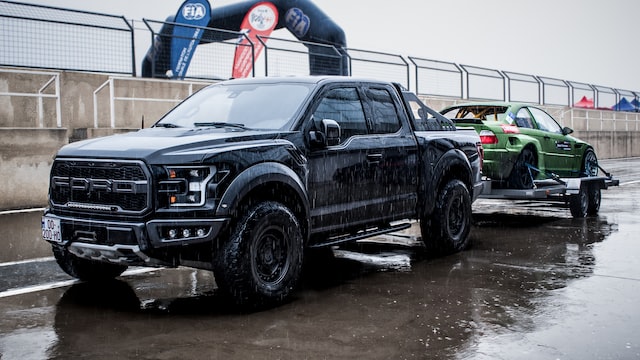Contents
- 1 Introduction
- 2 You might think yes, especially in the city.
- 3 Pickups have a lot of power and aren’t very nimble, so if you don’t know what you’re doing, you can get yourself into trouble.
- 4 There are differences between driving a pickup truck in town and driving one on the highway.
- 5 If you want to be safe, build up your skills with urban driving first.
- 6 Once you’ve done that, head out on the highway and get a feel for different driving situations.
- 7 A pickup truck is a great vehicle for bad weather and hauling lots of stuff, but make sure you know how to handle it safely before using it for these purposes
- 8 Conclusion
Introduction
If you’re in the market for a new pickup truck, you might be wondering if it’s hard to drive. You’ve probably heard that these vehicles are extremely powerful and not very nimble, which can make them challenging to operate. And yes, it’s true that driving a pickup truck is different than driving a sedan or minivan—but it’s also true that if you know what you’re doing, driving one will be just as fun as having any other car. In this article, we’ll talk about why pickups have more power than other vehicles on the road (it has something to do with their design), how they differ from cars in terms of safety features, and how best to handle this type of vehicle when operating in urban or rural settings.
You might think yes, especially in the city.
Pickups are large and heavy. They are powerful, with a lot of torque coming from their big engines. Add to that their lack of nimbleness and you may think that driving them in the city is not for you. But this is where pickups shine: they’re great for long distance travel, especially if you have to tow something behind your truck or carry lots of cargo inside (or both).
They have high ground clearance which means they can handle rugged terrain without getting stuck in mud or snow as easily as other cars do; plus there’s plenty of room inside for all your gear!
Pickups have a lot of power and aren’t very nimble, so if you don’t know what you’re doing, you can get yourself into trouble.
You’re not going to be able to drive a pickup like you would a sports car or SUV. Pickups have a lot of power, but they don’t have the agility that smaller vehicles have. If you don’t know what you are doing and try to drive them like other types of cars, it could get dangerous quickly.
Pickups are meant to do work–they’re meant for hauling things and pulling trailers around–and they aren’t expected or designed with speed in mind; they’re built for strength instead. So if you want to drive safely and slowly while learning how to handle your new pickup truck, then this article is for you!
There are differences between driving a pickup truck in town and driving one on the highway.
It’s important to know the differences between driving a pickup truck in town and driving one on the highway.
Trucks are heavier and have a higher center of gravity than cars, which makes them harder to handle when you’re trying to make tight turns or stop quickly. This is why it’s important for drivers who drive pickups every day to practice their skills regularly so that they can become comfortable with how their vehicle handles under different circumstances.
Another difference between pickups and passenger vehicles is that trucks tend to have more powerful engines than cars do–they can go faster and accelerate faster; however, this also means that they require more time and effort from the driver when starting from rest or changing lanes (due to their longer wheelbase).
If you want to be safe, build up your skills with urban driving first.
If you want to be safe, build up your skills with urban driving first.
City driving is more challenging than highway driving. The roads are narrower, there’s more traffic and it can be harder to see around corners or over hills and buildings. You’ll also have to learn how to use the brakes and steering wheel to slow down or turn as well as how to use mirrors so that you know what’s going on around you at all times.
If possible, practice these skills in a parking lot before attempting them on actual roads–and remember: safety first!
Once you’ve done that, head out on the highway and get a feel for different driving situations.
Once you’ve done that, head out on the highway and get a feel for different driving situations. Pickups are great for highway driving because they have a lot of power and can accelerate quickly. However, it’s important to know how to use this power safely. For example:
- Use your brakes when slowing down or stopping so that your vehicle doesn’t skid or slide out of control. This will keep everyone safe!
- The accelerator pedal is connected directly back into your engine so it takes less time than usual for air pressure within your tires (or lack thereof) affecting traction between their surface area contacting road surface versus nothing at all (which would cause loss of control). This means that as soon as you press down on said pedal–whether slowly or quickly–you’ll get results immediately rather than waiting several seconds like when operating other types vehicles such as motorcycles where engines aren’t located directly underfoot.”
A pickup truck is a great vehicle for bad weather and hauling lots of stuff, but make sure you know how to handle it safely before using it for these purposes
A pickup truck is a great vehicle for bad weather and hauling lots of stuff, but make sure you know how to handle it safely before using it for these purposes.
Pickups are often used as work vehicles because they’re rugged and can withstand harsh conditions like rain or snow. If you’re someone who works outside in bad weather on a regular basis, then owning a pickup truck might be the way to go!
Pickup trucks also come with plenty of storage space–perfect if you need to move things around often or take them somewhere else. This makes them ideal for hauling tools and materials from job site to job site (or even just between home and work).
Conclusion
A pickup truck is a great vehicle for bad weather and hauling lots of stuff, but make sure you know how to handle it safely before using it for these purposes. You might think that driving a pickup truck is hard because they have so much power and aren’t very nimble. However, if you don’t know what you’re doing then you could get yourself into trouble! If this sounds like something that could happen to you or someone else in your family then we suggest starting with urban driving first so that they can build up their skills before heading out onto highways where there are more variables involved such as other drivers who may not know how things work either.

